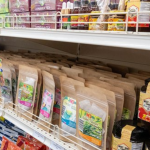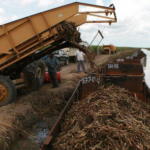Statement by the Honourable Zulfikar Mustapha, M.P, Minister of Agriculture.
“Opportunities for strengthening the Value Chain and expanding agriculture in a post COVID-19 Environment”
Wednesday, September 23, 2020
Ms. Sophie McKennon, IDB Country Representative
Mr. Shyam Nokta, President, Guyana Manufacturing and Services Association Limited
Panelist in today’s discussion Members of the GMSA and Ministry of Agriculture
Ladies and gentlemen
It is my pleasure to give brief
remarks on today’s discussion focused on, “Opportunities for strengthening the Value Chain and expanding agriculture in a post COVID-19 Environment”
First let me say, the Agriculture Sector Has What It Takes to Drive the economy Post-COVID-19.
Since March 2020, the unprecedented impacts of the COVID-19 pandemic has been felt not only in public health systems, but in the economy. The COVID-19 pandemic has amplified our awareness of the importance of food security.
Ladies and gentlemen, Guyana is a food secure country, having met global hunger targets in 1996 of the World Food Summit, and in 2000 of the United Nations Millennium Development Goals (MDGs). Guyana produces 59% of the food for consumption, which means our food import dependence is 41%[1]. It is the government’s intention to reduce this import dependence by creating an enabling environment for an efficient and competitive local manufacturing sector.
The agriculture sector, both the public and private sectors, are struggling to deal with the impact of the pandemic. Whilst, there is no major problem of availability of food, access to food through supply chain interruptions and loss of income are being experienced.
Guyana recently participated in a regional assessment on the Impacts of COVID-19 on Food Security and the Agriculture sector. This survey was carried out by FAO and CARICOM, during
July and August 2020, while the findings is still preliminary. Some of these include:
- Decline in farmers income – on average of 20-50% income loss of farmers
- Farmers reported difficulty accessing agriculture inputs – seeds and planting materials, and fertilizer and pesticides
- Prices of seeds/fertilizer are higher than usual
- Seed varieties/ Planting material & Fertilizers and Pesticides) regularly used are not available.
- Input Supplier and Food Traders recorded lower sales due to business restrictions and client’s restrictions and higher operating cost of agri-businesses
- Food trader have recorded a decline in customers and thus, the level of sales has decreased
- Food traders have experienced difficulties in terms of food items transportation in the last 3 months
- Food traders have recorded an increased in input prices, such as fertilizers and chemical
- Looking ahead agri-businesses expect difficulties in market supplies and sales
Therefore, we must focus on ways to expand, shift agriculture from primary producer to value-added, to reduce the 41% dependence on imports, which include, processed products, dairy products, grains such as corn and soybean etc. This expansion will aid in the reduction of our domestic Food Import Bill of GUY$45Billion. There is also the opportunity for Guyana to tap into the estimated US$8-10B (2020) CARICOM Market (Food Import Bill).
The Webinar today is timely as it paves a path forward for us to co-exist with COVID-19, which will be with us for foreseeable future, and at the same time cash in on the opportunities to expand agriculture. In this regard, I must thank the GMSA and its members for setting up the Webinar. It is also, timely as we are in the process of Budget 2020 and a few days before we launch Agriculture Month 2020 to discuss the subject of “Opportunities for strengthening the Value Chain and expanding agriculture”.
I must mention, I consulted with GMSA earlier this month and was briefed on the six (6) main challenges identified in the agro-processing industry, which include:
1. High cost of production, due to energy, access to raw materials, taxation
2. Lack of access to financing
3. Low Technology and Technical Knowledge
4. Lack of required Legislation, specifically, Food Safety
5. Lack of Marketing and Market Access
6. Poor coordination among enabling agencies and the Ease of Doing Business.
These constrained, especially, the high energy cost, has caused the sector to remain passive and not expanded at the rate one would like, as is evident is its contribution to GDP, which over the years has remained small but constant around 3-4% (other manufacturing, which comprises agro-processing). Therefore, to expand and strengthen this sector we must zoom in on these challenges and address them.
- High cost of production
i. Energy
The government fully comprehends the constraints affecting the businesses and their competitiveness. To this end, you would have seen that the Government in just one (1) month in office has already reversed VAT on exports, agriculture equipment, fertilizer, agrochemicals, pesticides etc and the reversal of land rent and D&I fees. These measures are contrived to enhance the private sector’s competitiveness and expansion so that they can realize or obtain some economies of scale. Furthermore, the Government is committed to the generation of cheap energy. In this regard, the government would pursue hydro-electricity, among other energy generation initiatives. No less a person than the President himself has committed to this. In his inauguration speech, the President said that the PPP/C Government is committed to providing the nation with “cheaper and more reliable electricity”. Over the next 5 years, the government will reduce the cost of energy by 50% through a mix of hydro, gas, solar, and wind.
ii. Access to Raw Material
Agriculture agencies, such as GMC and the NAREI will work with farmers to form formal market arrangement, such as clusters, to address the raw materials challenge for agro-processors and inputs for agro-producers. This will assist with issues of reliability, quantity and quality of supply.
With Budget 2020, the Ministry of Agriculture has started a “Rural Infrastructure Development Plan” targeting both D&I and Farm to Market Access Roads to reduce the cost of production for farmers. Additionally, we will coordinate with the Ministry of Public Works for the development of major infrastructural projects such as the Lethem Road, and to check on progress on the operationalization of the newly announced Ferry Service from Region One (Barima Waini) to Georgetown.
iii. Taxation
Budget 2020 gives “Tax concessions on Investment in Agro-processing Facilities, Cold Storage and Packaging” to provide opportunities for our agro-processors to grow, process, and trade more to increase their income. This is a start. We will continue to build on as the years’ progress.
Additionally, the reversal of VAT on electricity, water, machinery and equipment, exports, fertilizers, agro-chemicals, among others, will improve the viability of small business start-ups and the sustainability of existing businesses by reducing the cost of production and increasing competitiveness.
- Access to Financing
The government is committed to ‘Supporting Private Sector Development’ by pursuing and maintaining an environment for businesses (including agro-processing) to establish and to grow.
To this end, small businesses will be supported with $100 million for the Small Business Development Fund, to be used to provide loans and grants to prospective small business owners.
My ministry will work with the Ministry of Tourism, Industry and Commerce and with agri-businesses to ensure they can tap into this Fund. Whether it be assistance in the proposal or capacity building on how to get ‘value for dollar’ when operating a business.
3. Technology and Technical Knowledge
i. Research and Development
For us to fully take advantage of the opportunities for high value agro-processed products, there is a need or more R&D and it must be commercially viable. I give my Ministry’s commitment to closer working engagement between MOA agencies -GuySuCo, GRDB, NAREI, GSA, GMC- and Institute of Applied Science and Technology (IAST) etc. and the private sector so that R&D can be tailored and there is a link with businesses for investment and sustainability.
ii. Processing Technology and Techniques
We will work with producer’s groups and progressive farmers and agro-processors to establish processing facilities for the processing of agriculture produce, such as dried fruits, fruit juices, peanut butter etc. We will work to secure low-cost technologies for primary processing in rural areas
The Ministry of Agriculture will collaborate and coordinate with the Ministry of Tourism, Industry and Commerce to facilitate agro-processors in business incubators at the Industrial Estates located at Lethem and Belvedere.
5. Marketing and Market Access
For Budget 2020, Guyana Marketing Corporation has been allocated $236 million to support institutional market arrangement, strengthen value chain; work with farmers to be in compliance with quality standards and food safety systems, and expand new high value/processed markets for Guyana products.
i. Packaging and Labelling
To ensure that agro-processors are compliant with the international packaging and labeling requirements, the Guyana Marketing Corporation, has acquired the Genesis R&D software, which is used to compute nutritional facts for products. Additionally, Guyana Marketing Corporation has embarked on a project, purchasing packaging materials in bulk for sale to agro-processors. GMC and GMSA can build on its working partnership to ensure all members benefit from these initiatives.
ii. Domestic Market and CARICOM Market
Due to COVID-19, there are limited hours for operations of restaurant and food establishments, thereby, reducing the sales of farmers/businesses, however, another opportunity post-COVID-19 is a Public Procurement System of agriculture commodities to the government institutions such as the Army, Hospitals and School Feeding program be sourced from farmers or farmers’ groups.
These public intuitions are in constant need of agriculture produce and can be an outlet for farm supply. These facilities already spend government money to purchase food, therefore, we will direct a certain percentage to local farmers/ businesses.
Additionally, we need to work CARICOM through COTED to have a thorough assessment of the products which our Caribbean brothers and sisters are importing from outside of the region. A very cursory examination of the data[2] would show that there is more than US$14.2 Million market for fruits and vegetables in CARICOM, such products includes:
§ Cabbages US$4M
§ Bananas and Plantains – US$3.6 M
§ Tomatoes – US$2.9 M
§ Limes and Lemons – US$1.4
§ Pineapple US$1.3 M
§ Watermelons – US$ 808,000
§ Bora, Boulanger, Ochro and Pumpkin US$120,000
§ Mangoes – US$117,000
I find this unbelievable, since we have right here in Guyana the capacity and the capability to supply those very products. However, we as a Government must generate and create that enabling environment to assist the private sector to invest the necessary technologies and capacities to meet those demands and compete internationally. We are cognizant of this and we will work closely with the GMSA and the other stakeholders to develop a strategy to ensure that Guyana has a fair opportunity to satisfy those demands and most importantly, ensuring that we are capable of meeting those demands.
Additionally, the Ministry of Agriculture will engage with Ministry of Foreign Affairs to further this discourse.
6. Coordination and Improved Efficiency in Key Agencies
The Ministry of Agriculture in collaboration with the GMSA will formulate a Joint Technical Working Group to work out these challenges and coordinating mechanism among both private and public sector to improve efficiency, including, key agencies such as
§ Agencies of the MOA – GMC, NAREI, GLDA, Food Safety Authority –
§ Food and Drug Department
- Guyana National Bureau of Standards
- GOINVEST
- Guyana Revenue Authority
To be able to achieve this, we need a transformation in the areas outlined. I am giving you my commitment and the commitment of the government to achieve this sectoral change. We have begun radical shifts in policies, especially investments, as was announced in the Budgetary Measures in Budget 2020 that I have mentioned before.
Despite the challenges of COVID-19, you will agree with me that this is an opportune time to be involved in agri-business. And with my ministry and partners such as the Inter-American Development Bank and the private sector, like the GMSA.
This sector is too important to Guyana for use to allow it to be left behind. Agriculture has always been an important contributor to our economic growth and social development. It contributes 20% to the national GDP, approximately G$70 Billion to the foreign earnings, and employs 17% of our population.
It is for these reasons and those mentioned before, that we must continue to engage and keep the dialogue going on how we can work together to build and sustain a prosperous agriculture sector.
I thank you!





